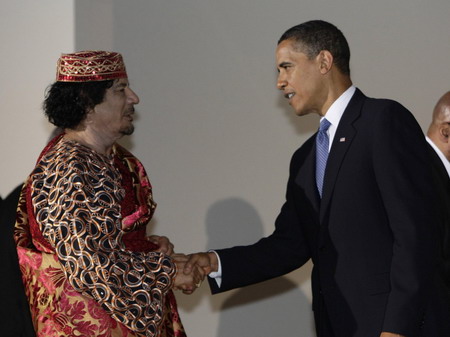BRET STEPHENS: THE LIBYAN APPRENTICE….SEE NOTE PLEASE
http://online.wsj.com/article/SB10001424053111903461304576524170306994658.html
THEY ALL GAVE QADDAFI A PASS…..BUSH AND OBAMA..RSK
Seif Gadhafi, his father’s heir apparent, proved that evil is never banal and often self-conscious.
Why did the tiny Jewish state defeat its enemies time and again? Because, he explained, the Israeli army is not top-heavy with generals the way Arab armies typically are. Israeli NCOs know how to take the initiative without clear orders from the top. And mid-ranking officers don’t while away the hours scheming to take over the state.
So spoke the second son of Col. Moammar Gadhafi, apropos, I suspect, of the fact that I am a past editor of the Jerusalem Post. What did he intend by it? Was the praise for the Israeli military meant as a kind of diplomatic overture, or was it simply a remonstrance against brain-dead Arab ways? Did the scarcely veiled critique of his father’s regime—indeed, of the very way he came to power—hint at a broader change in political direction for Libya, or was it just fodder for credulous Westerners? If good wombs could bear bad sons, I wondered, maybe the reverse could also be true.

US President Barack Obama shakes hands with Libya’s leader Muammar Gaddafi (

Nasser Nasser / AP
It didn’t take long before I was reminded of the Iron Rule of Davos: Nothing good that comes of it is ever real, and nothing real that comes of it is ever good.
Associated PressSeif Gadhafi, proof that evil is never banal and often self-conscious.
Shortly after my encounter with Seif, the case of Libya’s imprisoned Bulgarian nurses—preposterously accused of infecting hundreds of Libyan children with HIV, horribly tortured, sentenced to death, and ultimately released as part of a diplomatic minuet that included arms sales to the regime—burst freshly into view. Then there was the case of Lockerbie bomber Abdel Baset al-Megrahi, given a hero’s welcome in Tripoli after his release on bogus humanitarian grounds by Scottish politicians. Col. Gadhafi also found time to declare jihad against Switzerland out of pique that his miscreant son, the aptly named Hannibal, had been detained there for beating a servant.
As for the Israeli angle, there was also the case of Rafram Chadad, an Israeli artist who was arrested in Libya while on an assignment to photograph the physical remains of the Jewish community of Tripoli. In a February interview with Tablet magazine, he described the methods of his torture:
“They tied me up again and began to hit my soles and knees with an iron pipe. After that they made me take my clothes off, and sitting in my underwear, they connected a car battery to my fingers and administered electric shocks.” Mr. Chadad then recalled the chilling words of his interrogator: “Welcome, you are in the custody of the Libyan secret police. We are the worst secret police in the world. If you had heard stories about us, you would kill yourself now.”
Where was Seif Gadhafi during all this? About the Bulgarian nurses, he freely admitted to al Jazeera that their confessions had been extracted by torture. About Megrahi, he was quick to say that the release was part of a quid pro quo with the British government involving lucrative oil concessions. About Mr. Chadad, he acknowledged the Libyans knew the Israeli was no spy but arrested him anyway “to reap benefits.”
Seif, in other words, knew that his was a kingdom of cruelty. He knew of the arbitrary arrests, the routine prison torture, the cynical diplomatic ploys, the wanton mistreatment of foreigners, the top-to-bottom abuse of the people. For a time he burnished a reputation as a reformer, aided by puff pieces in the New York Times that touted his “bold independent streak.” And Sarah Leah Whitson of Human Rights Watch wrote in 2009 about a “Tripoli Spring” and praised Seif as “the real impetus for the transformation.”
Yet when the rebellion against the regime began, he promised to fight “until the last bullet” and later warned “liberals” that they would either “escape or be killed.” He also threatened to forge an alliance with Islamic extremists.
Now Tripoli is all but fallen and Seif is reportedly under arrest and possibly headed for a war crimes tribunal at The Hague. What are we to think of his loyalty to his father, other than as a proverbial case of the dog returning to his vomit? Nothing much I suspect, except as a fresh reminder that tyrants are not just tortured souls or over-zealous ideologues or misunderstood dreamers, and that evil is never banal and often self-conscious. The essence of tyranny is lust for power. And people will sacrifice for their lusts.
The more important question is why so many Westerners were ready to fall for Seif. He was intelligent, often surprising, wore well-cut suits and chewed his food with his mouth shut. He was also the face of a regime that tore through abattoirs of human flesh. The very name Seif means “sword.” Who could have forgotten it?
Nearly everybody did. Nearly everybody, out of some combination of moral indifference, economic self-interest, political calculation or a willingness to suspend disbelief, wanted to give Seif and his father’s regime a pass. Now sage commentaries are being offered as to whether the unkempt rebels will be able to chart a better course for Libya. They would do better to ponder what would have become of Libya in the grip of the polished apprentice in his immaculate suits.
Write to bstephens@wsj.com
Comments are closed.


